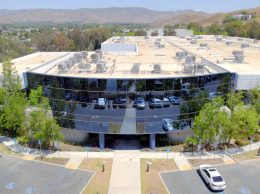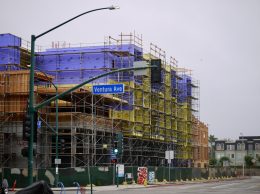Leaders talk redevelopment at Reagan library
California cities struggling to finance projects after the state abolished redevelopment agencies may get some relief from Sacramento, business leaders were told at a breakfast meeting Friday at the Ronald Reagan Library in Simi Valley.
But the extent of any relief is unclear, according to panelists at a Corporate Leaders Breakfast sponsored by Cal Lutheran University.
The breakfast speakers were Scott Mitnick, city manager of the city of Thousand Oaks; Scott Sollers, a managing director at the public finance firm Stone & Youngberg; and E. Kurt Yeager, an attorney specializing in municipal finance. The panel was moderated by Jim Rondeau, director of operations and programming at KCLU.
Their discussion on the future of redevelopment turned to Infrastructure Financing Districts, a tool that has been in place for 22 years in California but employed only twice, according to information supplied by panelists. The Legislature has sent three measures to Gov. Jerry Brown that would make it easier to use the financing tool for redevelopment.
Mitnick said capital projects worth $20 million in the city of Thousand Oaks are not under construction because the state ordered the abolition of redevelopment agencies and moved to seize their funds. He mentioned some examples of projects on hold: plans to bury utility wires underground along Thousand Oaks Boulevard, storm drain improvements in Newbury Park and school infrastructure work.
Sollers explained that an Infrastructure Financing District, or IFD, can function somewhat like a redevelopment agency, but with a more limited scope. Cities and counties can form such districts and issue bonds for public works projects. Incremental tax revenues would go to retire the bonds instead of to the locality’s general fund. The districts are not allowed to fund school improvements, and approval of the diversion of incremental tax revenues requires a two-thirds vote of affected parties.
Proposals on Gov. Brown’s desk would ease the voting requirement and expand the kinds of projects that would be allowed.
Yeager said he expects to see an experimentation stage if Brown signs off on easing some of the rules for IFDs. If they are too cumbersome, he said, there will be proposals to liberalize them.
Mitnick told the Business Times after the program that modifying the rules on IFDs would be a small but important step in helping to deal with the infrastructure void that the loss of redevelopment has created.
“It’s all going be case by case depending on how they might be utilized in each city. I can’t make a blanket statement,” he said. “It depends on what are the infrastructure needs of each community and what authority will these proposed bills provide to that community. It all depends on the project, and the devil is in the details.”
Yeager, whose main practice is as bond counsel to public agencies, said local governments will likely have to turn more often to taxes levied by Mello-Roos community facilities districts and business improvement districts, and to local sales taxes to fund some redevelopment needs.
“Most of the tools now will require the creation of new revenues or the depletion of existing revenues and that’s just a much tougher nut to crack in these tough times,” he said.
Mitnick pointed out that California and Arizona are the only two states that have done away with tax-increment financing for redevelopment. He said this puts California at a competitive disadvantage, as other states can tell companies they can make redevelopment work for them.
The Thousand Oaks city manager said he was trying to stay positive at the breakfast, but at times he voiced his frustration with the loss of redevelopment funds. He said that if the state of California had done to private companies what it has done to redevelopment agencies, there would be a revolution.
The panel session gave an indication of sentiment on Gov. Brown’s tax increase proposal on the November ballot. Yeager asked for a show of hands among the crowd of business leaders on how many were planning vote for the plan. The vast majority indicated they were against it.










